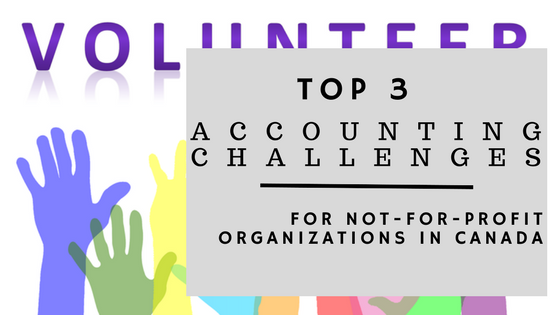Top 3 accounting challenges for Not-For-Profit organizations in Canada
by Alex | Sep 2, 2017 | Books + beyond

In today’s Not-For-Profit (NFP) environment,regulatory changes, compliances and fundraising are the headwinds for a lot of NFPs. Large NFPs may have enough resources to handle all the challenges but not for a lot of small NFPS who lack of fundings and supports. Accounting challenge is one of the challenges that they need to address immediately. Imagine that you are a director with a small NFP whose staff/volunteers might not have the expertise in NFP fund accounting, you may find the answer why the audit fee is high.
Here are 3 top accounting challenges for NFPs
-
The accounting is complex enough for NFPs.And there are many stakeholders having specific interests.The accounting for NFPS needs to be flexible to feed the data for various interests. For example, government grants funding and wants assurance on their contribution to NFPs have been used properly based on the funding criteria.Some major donors also want the donation is deployed based on their wish.Needless to say, the Canada Revenue Agency requires all NFPs to submit an annual information return as well as audited financial statments.In some cases, fundraisers for NFPs may have different goals to achieve like having data to support the results of each campaign without accounting jargon. But the accounting data organized based on accounting principles may not be suitable.A practical tip is to make sure the reporting requirements are well defined and reconciliation needs to be prepared to ensure all the users are on the same page.
-
As NFPs are struggling in securing funding in various projects, generally speaking, NFPs have a small budget for annual audit. But audits are expensive as it involves with audit planning, fieldwork as well as financial statements preparation.How can those NFPS with small budgets deal with this challenge then? A good quality of accounting records prepared based on accounting rules and running year-end audit like a project are the secrets to reduce the audit fees.
-
Accounting for contributions is a common challenge for a lot of volunteer accountants for NFPs.NFPs are required to distinguish between contributions and other revenues, and report on contributions in their financial statements. As each type of contribution has different purposes as to its use, each one needs to be tracked separately and reported on separately. Once NFPs decide the selection of revenue recognition policy early in its existence, when contributions are first received, the accounting for contribution can be set up and becomes a routine work unless the method is altered. There are two methods of accounting for contributions:
The Deferral Method and The Restricted Fund Method.
The bigger challenge in accounting is how to leverage accounting software to track externally restricted contributions and internally restricted net assets, which is the method called fund accounting.Fund accounting groups together transactions and accounts related to similarly restricted activities. Each fund has its own revenues and expenditures, its own assets and liabilities and its own net asset balance (when using fund accounting, the latter is called a fund balance).
Those are 3 top accounting challenges that NFPs may face these days. There are other areas like record-keeping for the CRA annual information returns, whether the staff should be contractors or on T4s, performing financial analysis for the Board to benchmark with other NFPs for improvement that need NFPs management attention as well. Those challenges can be conquered.The better the management plans and prepares, the high chance that those issues can be addressed.
FranklyCA makes your business life simpler and more focused.We help our clients prepare beautifully organized accounting data (call books)/working paper.By leveraging the technology, we make it easy for you(business owners) to picture the competitive business world and be prepared for future growth. Bookkeeping should be wonderful. We love it as we believe,there is a gold mine in your books. Give us a call or email us. We surely can help.

Recent Comments